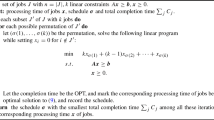Abstract
We discuss the well known online job scheduling problem with release times and deadlines, alongside an extended model—buffer management for packets with processing requirements. For job scheduling, an \({\varOmega }\left( \sqrt{\frac{\log {\kappa }}{\log {\log {\kappa }}}}\right) \) lower bound on the competitive ratio of any randomized preemptive algorithm was shown by Canetti and Irani (Proceedings of the 27th annual ACM symposium on Theory of computing, ACM, pp 606–615, 1995), where \(\kappa \) is the the maximum job duration or the maximum job value (the minimum is assumed to be 1). The proof of this well-known result is fairly elaborate and involved. In contrast, we show a significantly improved lower bound of \({\varOmega }(\log {\kappa })\) using a simple proof. Our result matches the easy upper bound and closes a gap which was supposedly open for 20 years. We also discuss the problem of handling a FIFO buffer of a limited capacity, where packets arrive over time and may be preempted. Most of the work in buffer management considers the case where each packet has unit processing requirement. We consider a model where packets require some number of processing cycles before they can be transmitted. We aim to maximize the value of transmitted packets. We show an \({\varOmega }\left( \frac{\log {\kappa }}{\log {\log {\kappa }}}\right) \) lower bound on the competitive ratio of randomized algorithms in this setting. We also present bounds for several special cases. For packets with unit values we also show a \(\varphi \approx 1.618\) lower bound on the competitive ratio of deterministic algorithms, and a 2-competitive algorithm. For the case of packets with constant densities we present a 4-competitive algorithm.
Similar content being viewed by others
Notes
By adding small perturbations the lower bound holds for algorithms that do not preempt when the ratio is exactly 2.
References
Aiello, W.A., Mansour, Y., Rajagopolan, S., Rosén, A.: Competitive queue policies for differential services. In: Proceedings of IEEE INFOCOM, pp. 431–440 (2000)
Albers, S., Schmidt, M.: On the performance of greedy algorithms in packet buffering. SIAM J. Comput. 35(2), 278–304 (2005)
Azar, Y., Litichevskey, A.: Maximizing throughput in multi-queue switches. In: Algorithms—ESA, pp. 53–64. Springer (2004)
Azar, Y., Richter, Y.: An improved algorithm for CIOQ switches. ACM Trans. Algorithms 2(2), 282–295 (2006)
Canetti, R., Irani, S.: Bounding the power of preemption in randomized scheduling. In: Proceedings of the 27th Annual ACM Symposium on Theory of Computing, pp. 606–615. ACM (1995)
Chuprikov, P., Nikolenko, S., Kogan, K.: Priority queueing with multiple packet characteristics. In: Proceedings of IEEE INFOCOM, pp. 1418–1426 (2015)
DasGupta, B., Palis, M.A.: Online real-time preemptive scheduling of jobs with deadlines. In: Approximation algorithms for combinatorial optimization, pp. 96–107. Springer (2000)
Englert, M., Westermann, M.: Lower and upper bounds on FIFO buffer management in QoS switches. In: Algorithms—ESA, pp. 352–363. Springer (2006)
Englert, M., Westermann, M.: Considering suppressed packets improves buffer management in qos switches. In: Proceedings of the 18th Annual ACM-SIAM Symposium on Discrete Algorithms, pp. 209–218. Society for Industrial and Applied Mathematics (2007)
Garay, J.A., Naor, J., Yener, B., Zhao, P.: On-line admission control and packet scheduling with interleaving. In: Proceedings of 21st Annual Joint Conference of the IEEE Computer and Communications Societies, vol. 1, pp. 94–103. IEEE (2002)
Goldwasser, M.: A survey of buffer management policies for packet switches. ACM SIGACT News 41(1), 100–128 (2010)
Kalyanasundaram, B., Pruhs, K.: Speed is as powerful as clairvoyance. J. ACM 47(4), 617–643 (2000)
Kesselman, A., Kogan, K., Segal, M.: Packet mode and qos algorithms for buffered crossbar switches with fifo queuing. Distrib. Comput. 23(3), 163–175 (2010)
Kesselman, A., Kogan, K., Segal, M.: Improved competitive performance bounds for CIOQ switches. Algorithmica 63(1–2), 411–424 (2012)
Kesselman, A., Lotker, Z., Mansour, Y., Patt-Shamir, B., Schieber, B., Sviridenko, M.: Buffer overflow management in QoS switches. SIAM J. Comput. 33(3), 563–583 (2004)
Kesselman, A., Patt-Shamir, B., Scalosub, G.: Competitive buffer management with packet dependencies. In: Proceedings of the IEEE International Symposium on Parallel and Distributed Processing, pp. 1–12. IEEE (2009)
Kogan, K., López-Ortiz, A., Nikolenko, S., Sirotkin, A.: Multi-queued network processors for packets with heterogeneous processing requirements. In: 5th International Conference on Communication Systems and Networks, pp. 1–10. IEEE (2013)
Kogan, K., López-Ortiz, A., Nikolenko, S., Sirotkin, A.V., et al.: A taxonomy of semi-FIFO policies. In: Performance Computing and Communications Conference (IPCCC), IEEE 31st International, pp. 295–304. IEEE (2012)
Nikolenko, S.I., Kogan, K.: Single and multiple buffer processing. In: Encyclopedia of Algorithms, pp. 1988–1994. Springer (2016)
Kogan, K., Nikolenko, S., López-Ortiz, A., Scalosub, G., Segal, M.: Balancing work and size with bounded buffers. In: COMSNETS, pp. 1–8 (2014)
Koren, G., Shasha, D.: D over; an optimal on-line scheduling algorithm for overloaded real-time systems. In: Real-Time Systems Symposium, pp. 290–299. IEEE (1992)
Mansour, Y., Patt-Shamir, B., Lapid, O.: Optimal smoothing schedules for real-time streams. In: Proceedings of the 19th Annual ACM Symposium on Principles of Distributed Computing, pp. 21–29. ACM (2000)
Mansour, Y., Patt-Shamir, B., Rawitz, D.: Overflow management with multipart packets. Comput. Netw. 56(15), 3456–3467 (2012)
Pruhs, K.: Competitive online scheduling for server systems. ACM SIGMETRICS Perform. Eval. Rev. 34(4), 52–58 (2007)
Pruhs, K., Sgall, J., Torng, E.: Online scheduling. Handbook of Scheduling: Algorithms, Models, and Performance Analysis, pp. 115–124. Chapman and Hall/CRC (2003)
Author information
Authors and Affiliations
Corresponding author
Additional information
Supported in part by the Israel Science Foundation (Grant No. 1506/16) and by the Israeli Centers of Research Excellence (I-CORE) program (Center No. 4/11).
Rights and permissions
About this article
Cite this article
Azar, Y., Gilon, O. Scheduling with Deadlines and Buffer Management with Processing Requirements. Algorithmica 78, 1246–1262 (2017). https://doi.org/10.1007/s00453-016-0257-1
Received:
Accepted:
Published:
Issue Date:
DOI: https://doi.org/10.1007/s00453-016-0257-1




